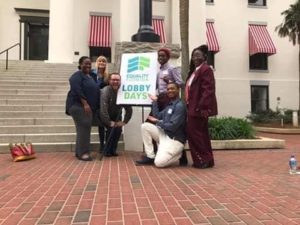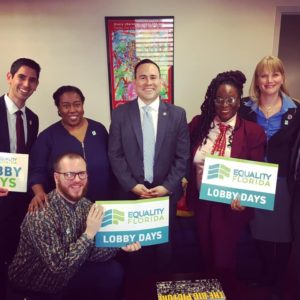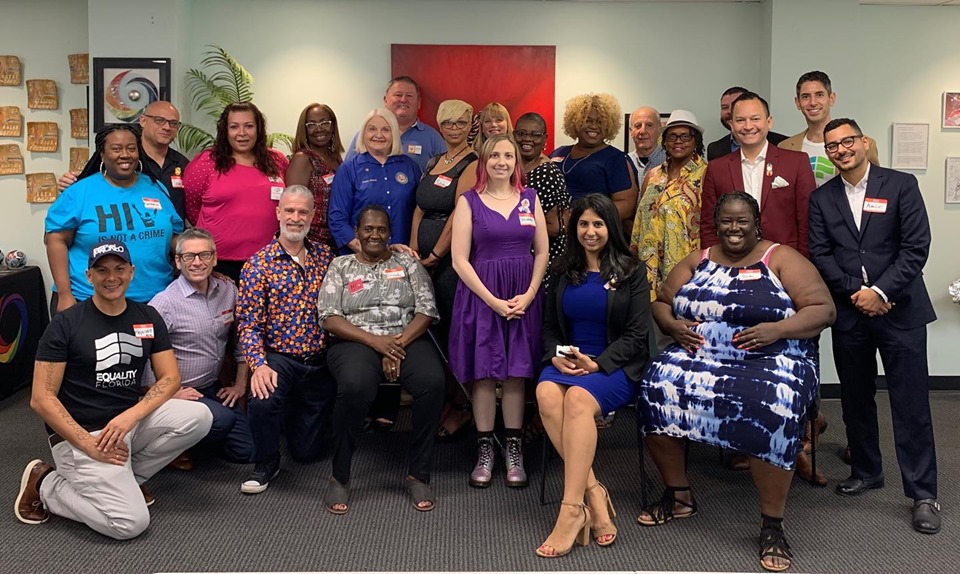Q. You have been working with the Florida HIV Justice Coalition to modernize the current HIV statute. What has that process been like? Why is it important for this to happen?
A. The FL HIV Justice Coalition brings together people living with HIV, HIV advocates, and people representing organizations that work with people living with HIV and/or at the intersections of HIV, to bring our state’s laws into alignment with current science. Florida still has–and enforces–laws that criminalize people living with HIV for consensual sex acts.
A person living with HIV can be convicted of a felony in Florida for consensual sex acts where there was no intent to harm, no harm occurred, and no transmission of HIV took place (or was even possible, since the law doesn’t look at what we know about modern science, such as that a person with an undetectable viral load cannot transmit HIV, and doesn’t take into account other factors such as whether condoms were used).
The National HIV/AIDS Strategy recommends that states review their criminalization laws to be sure they don’t undermine public health goals of testing and treatment, and CDC researchers reaffirmed that recommendation in a 2017 study, in which they found that HIV criminalization laws had “no detectable prevention effect.” We are working together to make Florida a state where nobody fears being tested or treated for HIV.
 Coalition work is always a challenge, since you are bringing together a lot of people representing different geographic locations and who have different perspectives and priorities; but it’s important that we find common cause and work together to present a unified voice when we speak with lawmakers, with the media, and with the public about our goals. We hold monthly coalition webinars where the co-chairs of our different working groups share updates and projects they are working on, and where we are able to update the full coalition on any progress that has been made with legislators, any changes to the bill, news about where the bill has gone and where it’s headed next, etc. Though we do not have a bill introduced yet for this session, we anticipate our sponsors filing one soon, and we are working with them on that to do our best to make sure that the bill language reflects our priorities as a coalition.
Coalition work is always a challenge, since you are bringing together a lot of people representing different geographic locations and who have different perspectives and priorities; but it’s important that we find common cause and work together to present a unified voice when we speak with lawmakers, with the media, and with the public about our goals. We hold monthly coalition webinars where the co-chairs of our different working groups share updates and projects they are working on, and where we are able to update the full coalition on any progress that has been made with legislators, any changes to the bill, news about where the bill has gone and where it’s headed next, etc. Though we do not have a bill introduced yet for this session, we anticipate our sponsors filing one soon, and we are working with them on that to do our best to make sure that the bill language reflects our priorities as a coalition.We are also working on educating the general public about the issue of HIV criminalization and about HIV more generally, as this is sorely needed in Florida. A group of us published an opinion piece in the Tampa Bay Times on September 19 about what real public health solutions to the HIV epidemic in Florida look like, and why criminalization gets in the way of those solutions and creates problems without solving any. We [Kamaria, Christine of Sex Worker Outreach Project [SWOP] Behind Bars, and Carson of SWOP] were also on a radio show last week on Tampa Bay public radio talking about this. There are also plans underway to do education of law enforcement, media, and the general community through direct engagement. In addition to that, working to prepare and equip advocates in speaking with legislators in for lobby day experiences and even crafting questions for social media to ask presidential candidates as we approach elections next year.
Q. News broke recently that former governor Rick Scott rejected federal funds to fight the HIV epidemic in Florida. What does this mean for Floridians living with and vulnerable to HIV?
A. As governor, Rick Scott rejected $70 million in federal funding to fight Florida’s HIV epidemic between 2013-2017. In that same time period, new diagnoses rose by 11% in Florida, even as they dropped dramatically in states that focused heavily on treatment for people living with HIV and expanding testing and prevention options. It is upsetting that over 23,000 people acquired HIV in those four years when our state government could have done more to make sure that everyone diagnosed had access to care and to services and supports that would help them stay in care, such as stable housing, mental health care, substance abuse treatment, transportation, etc.
The new governor, Ron DeSantis, announced just after the Guardian story broke that his administration would have a “robust plan” to fight HIV. We don’t have details about that plan yet, but as advocates, we can only hope that the governor will not refuse funding that is badly needed for testing, care, and prevention. We know that ending the epidemic in Florida is going to require real investment in those things as well as centering the voices and lives of people living with HIV to help drive awareness and action. We also know that pills alone aren’t enough.
 Too many Floridians living with HIV, especially in large metropolitan areas, have trouble finding and staying in affordable housing. Florida didn’t expand Medicaid, meaning many lower-income Floridians lack comprehensive health insurance. In the less urban parts of the state, it can be difficult to access care for HIV–it may require long drives, and there are very limited options for people relying on Ryan White or even to participate in planning councils that impact their lives. I serve as my planning council’s Vice Chair. I drive an hour to attend meetings. When accessing care, I am willing to drive that same distance because the county I live in has been lacking in providing consistent provider attention. There aren’t many AIDS Service organizations to choose from in close distance and maintain privacy of where someone seeks care for HIV, so it’s difficult to navigate when the historical residue of stigma still holds strongly in many areas.
Too many Floridians living with HIV, especially in large metropolitan areas, have trouble finding and staying in affordable housing. Florida didn’t expand Medicaid, meaning many lower-income Floridians lack comprehensive health insurance. In the less urban parts of the state, it can be difficult to access care for HIV–it may require long drives, and there are very limited options for people relying on Ryan White or even to participate in planning councils that impact their lives. I serve as my planning council’s Vice Chair. I drive an hour to attend meetings. When accessing care, I am willing to drive that same distance because the county I live in has been lacking in providing consistent provider attention. There aren’t many AIDS Service organizations to choose from in close distance and maintain privacy of where someone seeks care for HIV, so it’s difficult to navigate when the historical residue of stigma still holds strongly in many areas. Florida also has a much larger immigrant population than many other states, and many immigrants are ineligible for state and federal assistance programs, or may even fear accessing care or services they are eligible for because of the federal government’s attacks on immigrant rights–for example, some immigrants have reported being afraid that seeking treatment for HIV could get them reported to ICE.
Q. What efforts are underway within the coalition to address the harm that former governor Rick Scott caused to the community of people living with HIV in Florida?
A. The coalition is focused specifically on ending HIV criminalization laws in Florida, first through modernization–bringing the current laws into alignment with science. Of course we would like to fully decriminalize HIV status eventually, but the Florida legislature can be a challenging place to move progressive legislation through, so we are taking things step by step and working with our legislative champions for the best possible bill we can get that will still have a chance of passage. Part of our messaging in this campaign is refocusing on proven public health solutions. Florida’s HIV epidemic is a public health issue that requires public health solutions, not law enforcement and criminal justice.
We are working to move this issue back into the public health space, where it belongs, and out of the criminal justice space. Legislation is part of this, but we also need a broader culture change. Stigma is still very strong here, as in so many other places. So many people, inside and outside of government, have very outdated, inaccurate understandings of what HIV is, who contracts it, and how. We want to change the law because it is unjust and wrong, but we also want to change hearts and minds, so that people understand that courts and jails won’t prevent people from acquiring HIV–but investing in treatment, supportive services, expanded prevention, and education will.
Q. Team Shine in Florida is one of the teams with Organizing for Power: Road to 2020. What electoral organizing strategies has Team Shine been a part of and why?
A. Team Shine is having an electoral watch for the Democratic Party debate. We started the conversation over hot wings and popcorn with friends and family in our community. We did this to make the community aware of our presence and to let them know that we will be active and accountable in the 2020 election. We are encouraging and educating the community with information that will lead to a huge voter turnout for change.
Q. What electoral organizing skills do you hope to gain from the in-person meeting in October as a team?
A. Team Shine hopes to learn all that we can to achieve our electoral organizing goals. We want to learn strategies and best practices when collaborating with other organizations. We want to learn how to engage our community on topics that matter most to us. We want to get the facts to our voter base so they make informed decisions on candidates and their stances on our issues. We want to drive voter registration.
Q. What are the benefits to being a part of Team Shine and Organizing for Power: Road to 2020?
A. We get to represent our state while advocating for the needs of people living with HIV in healthcare and be an active force in community change efforts, such as making sure recently released people gain the right to vote in spite of fines they may owe. That is a big part of the work we do with the Florida Rights Recovery Coalition.
A. We get to represent our state while advocating for the needs of people living with HIV in healthcare and be an active force in community change efforts, such as making sure recently released people gain the right to vote in spite of fines they may owe. That is a big part of the work we do with the Florida Rights Recovery Coalition.



